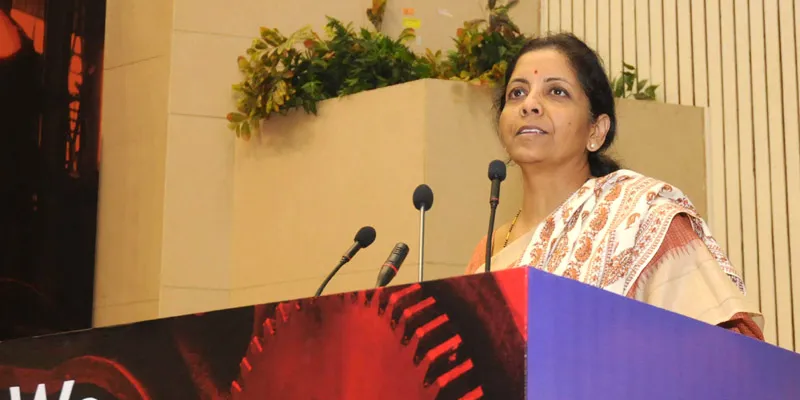Budget 2021: What the MSME sector expects from FM Nirmala Sitharaman
Given the severity of the impact of COVID-19 on the economy and the need to pull the economy back on track, the MSME sector expects the Union Budget to take additional measures to support small businesses.
Unprecedented circumstances require unprecedented measures. This is likely to be witnessed in the upcoming Union Budget as the Finance Minister has promised to deliver a ‘Budget like never before’.
Globally, governments are facing massive policy and operational challenges and are adopting unconventional measures to revive their economy. A big bang package of reforms is thus on the anvil. Expectations are high from the current Budget, which is expected to outline government strategy to revive the various segments of the economy from the severe slowdown caused by the pandemic.
Undeniably, the government has a difficult task of manoeuvring the nascent recovery of the economy and managing the fiscal burden, which is expected to remain high not only for the current year, but also for the subsequent years.
COVID-19 had been the third shock to the Micro, Small & Medium Enterprises (MSMEs) after demonetisation and GST. The government has been taking a host of measures to help small businesses withstand the impact of the crisis since the nationwide lockdown was announced in March 2020.

Union Finance Minister Nirmala Sitharaman
With progressive unlocking, businesses are clocking higher transactions and supply disruptions are normalising. This is corroborated by Dun & Bradstreet's commerce disruption tracker, which shows that around 41 percent of businesses remain disrupted as of December 4, 2020, compared to 90 percent in mid-July 2020.
Nonetheless, given the severity of the impact of COVID-19 on the economy and the need to pull the economy back on track, we expect the Union Budget to take additional measures to support the MSMEs.
Further, an enabling ecosystem can help MSMEs gain visibility and credibility on a global level. These are some of the expectations from the MSME sector:
o Enhancing the collateral-free loan limit, which currently stands at up to Rs 2 crore. Dissemination of information related to collateral-free loans should be made mandatory with loan applications made by MSMEs and choice of borrowing under the scheme should be made available to MSME entrepreneurs, wherever applicable.
o Developing the Intellectual Property (IP) finance ecosystem – The government is expected to announce some measures to help innovate firms, especially startups, to access capital using IP as collateral.
o Addressing the issue of delayed payments to MSMEs - In most locations, MSMEs lack awareness about the MSME Samadhaan platform, which deals with issues related to delayed payment by Central and State governments, PSUs, or the private sector. An awareness drive can be initiated by the MSME Facilitation Council, public sector banks, or industry associations. Besides, an Act to mandate timely payments by the government and other large companies can address the cash flow problems of MSMEs.
o Simplification of GST - The recent notification which mandates that enterprises with over Rs 0.50 million in monthly turnover will be levied at least 1 percent of their GST liability in cash and this will not be allowed to be set off against input tax credit should be revoked for the fiscal year FY22.
o Ease cost of doing business by simplification of land laws and reducing the registration cost of land for MSMEs beyond a certain threshold.
o Strengthening the value chain of MSMEs - The government is expected to announce measures to strengthen the value chain of MSMEs. Not only the local supply chains should be made stronger and more resilient, but incentives to help MSMEs should become a part of the global value chain.
The measures could include making export income tax free for micro and small enterprises for three years and medium for two years and tax deduction on product development for exports. Incentives for use of better technology and designs and investing in Research & Development (R&D) should be given to MSMEs for three years to establish a strong foothold in the global value chain.
o Helping MSMEs access potential partners - Due to the realignment of global supply chains, many global companies might start sourcing from India or establish their manufacturing base. This would provide opportunities for SMEs. However, accessing the information of potential partners can be a challenge. Thus, initiatives must be taken by the government to create an online platform where information on firms, global or domestic, approaching the government for business opportunities are readily available. The government in turn can partner with the private firms to develop this initiative.
o Inculcating digital skills amongst MSMEs - The skilling initiatives by the government should include training in soft skills, technical skills, and digital literacy. All the initiatives taken by various States and Central government should inculcate digital skills amongst participants.
o Help MSMEs to sell their products online - Most of the micro-enterprises are not equipped to operate computers or access content through apps on smartphones. A huge opportunity exists for MSMEs if they can optimise their web presence and capabilities. The government, in association with private consortia, can educate and train MSMEs on how to avail these marketing tools and provide niche marketing services to SMEs depending on their requirement and expansion plan.
For YourStory's multimedia coverage of Budget 2021, visit YourStory's Budget 2021 page or budget.yourstory.com
Edited by Megha Reddy








